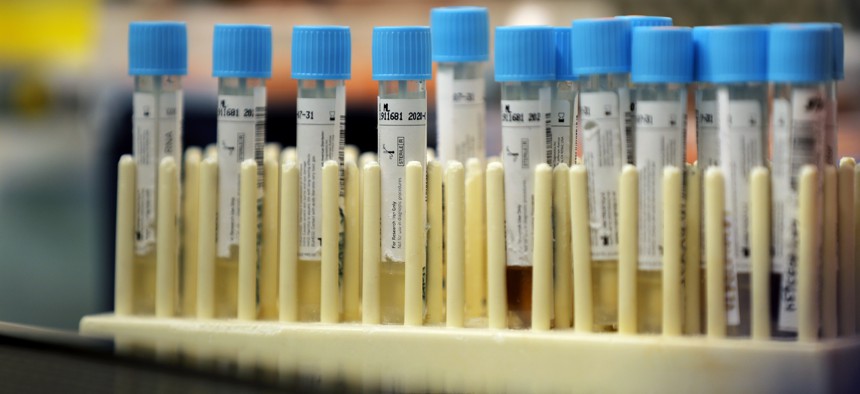'It Can Happen to Anybody': When Coronavirus Spreads at a Local Health Department

AP Photo/Gerald Herbert

Connecting state and local government leaders
Six employees at the Toledo-Lucas County Health Department tested positive for coronavirus. All were key to the department's pandemic response plan, leaving officials scrambling to find replacements.
In the midst of responding to the Covid-19 outbreak, one staff member at the Toledo-Lucas County Health Department tested positive for the virus.
Then another employee got sick. Another positive test result.
And then another.
By March 30, six employees at the health department had tested positive for the coronavirus. After two positive tests, administrators closed the health department’s main building to the public for cleaning and disinfection. All six employees with positive tests went into quarantine, as did staffers who had been exposed to them—including Eric Zgodzinski, the county’s health commissioner.
“I did not expect this. I really didn’t,” said Zgodzinski, who is working from home isolation and remains asymptomatic. “But it’s better to be safe than sorry for my staff, and that’s all I cared about. When I heard that one of my employees had tested positive, it was around 11 at night, and I just made the decision to shut everything down, do a deep cleaning, regroup, and then just try to recover from that. So that’s what we’ve been doing.”
The health department hired a local company to sanitize the building, a process that included a fogger-like disinfectant and deep cleaning of every surface, including countertops and the backs of desk chairs. The building remains closed to the public but reopened on March 31 to select staff, who are administering what Zgodzinski referred to as “must-have” services, including federal nutrition programs.
“Every public health program is essential, but how essential is it to have further exposure to customers that could be Covid-positive? What are we really gaining from having those programs operational?” he said. “Right now, everything is Covid-19 all day long, except for some of those other things we have to do.”
Managing operations in the midst of a mini-outbreak among staff was difficult, Zgodzinski said. Health officials had undergone training to respond to a pandemic, but all six of the employees who tested positive were in management positions that were key to the department’s response plan.
“You plan for these things, but you don’t plan for your entire leadership staff to go down within 24 hours,” Zgodzinski said. “My succession plan included three people who were supposed to take my place if I went down. And they all went down.”
The department scrambled to construct a backup plan. Other staffers stepped in to fill the gaps, and Zgodzinski reached out to other agencies for help, including the University of Toledo, which dispatched graduate students from its public health program.
“Internally, we were able to hold down the fort. We responded pretty dang well, and we kept up with everything we needed to,” he said. “But it’s like a sports team. You have people that can back up your first team, but the first team are the ones doing it all the time, which makes it seamless. Just getting new people up to speed was difficult. But we did it.”
Health officials are reasonably certain that the outbreak can be traced to a patient who visited the clinic on March 9. The six employees became sick worked in close quarters, “so the virus got into that group and spread,” he said. “It’s scary, in the sense that this could knock out anybody’s leadership in the blink of an eye.”
As of Thursday, the department had not recorded any new cases among its own staff. The six employees who got sick are doing better, Zgodzinski said. None required serious medical intervention.
“I’ve got a couple of people who are still pretty ill and we need to watch them,” he said. “But now, knock on wood, we’re all right.”
The main takeaway from the experience, he said, is that Covid-19 does not discriminate, and careful planning could fall short in the midst of the still-growing outbreak. Government officials should take that seriously and encourage employees, when possible, to work from home.
“We are public health professionals. We understand the disease, we understand the 6-foot separation rule, we understand the need for hand-washing,” he said. “We understand all the ways that this disease can spread, and it still happened to us. And if it’s happening to us, it can happen to anybody. You just have to guard against it. You have to stay home.”

NEXT STORY: One City Is Rolling Out Weekly Testing of First Responders and City Workers




